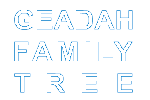Ever wondered why Arabic names have so many different spellings? Here are a few clues; in the words of reaganesque :
:
1. There is really NO SUCH THING as 'proper spelling' of an Arabic name in English. After all, we're dealing with two completely different alphabets. So, the translation of one name to another is completely subjective. A Abdallah family may very well be related to an Abdella or Abdullah family; a Hanna family to a Hanah family; a Maloof to a Malouf family. Keep this in mind when searching for relatives, censuses, and immigration records. Just because your name is Dib doesn't mean you should discard the Diebs at Ellis Island. What should be done: write down every spelling variant of a name that you can imagine on a piece of paper and try them, when you have time, one by one. Of course, this applies to place names as well. Beirut = Beyrouth = Beyrute etc.
2. Often, names come about as a result of conventional translation. As such, do some research on common translations of Arabic names. For instance, Peter is a translation of Boutros. So, if your grandfatherís name was Peter, he may be listed as Boutros in his immigration records (or vice versa). Now hereís the real kicker: depending on the port from which he travelled, he could be listed as a translation of Peter in any number of languages. If he came through Greece, it may have been written as Petros; if France, it could be Pierre. This is equally true of last names. For instance, the common name Hanna means John in Arabic. But in many other languages, John is translated as Johannes or Youness. My great great grandfather Zacharias Hanna even had his translated as Henes somehow. Believe it or not, they all mean the same thing.
3. Sometimes, the translation of a name is not even a real translation. My great uncle Mustafa Abdella, for instance, became Michael/Mike. Itís not a formal translation but he probably thought it was close enough. After all, who wanted to walk around the streets of St. Paul Minnesota in the 1900s with a name like Mustafa? The same is true of my great auntís husband, Abdellah Bejan. He went by Albert. The two are not actual translations of each other, but Albertís about the closest American name to Abdellah. In this instance, for something like immigration records, searching Ellis Island by first initial only can be helpful. You can also get a little creative with it. Put yourself in their shoes and think, ĎIf I had a name like Muhammed, whatís the simplest change I could make to it in order to fit in or make it easier for people to pronounce?í
4. Have you ever noticed that a lot of Syrian/Lebanese people have last names that could just as easily be first names (i.e. Thomas, Hanna, Abdulla, Joseph)? Thatís because they often WERE. Generally, upon arrival, a person took his fatherís first name as his last. The survival of family names was actually very rare. Of course, there are exceptions. For instance, the name Malouf is likely to be a family name. But if you have a name like Thomas (or a translation thereof), you must be open to the ideaóperhaps even assumeóthat Thomas was just the name of your great grandpa or whoeverís father. This can be extremely frustrating because it diminishes your chances of ever finding out if youíre related to another Thomas family. After all, how many people have named their kid Thomas? But there is some consolationóthat is, the distinct naming system among the Syrian/Lebanese.
5. Repetition of Syrian/Lebanese names is common, and will help you in your research. Most often (but not always), a man gave his oldest son the name of his paternal grandfather. That child would often have his fatherís name as a MIDDLE name. For instance, my great great grandfather Zacharias John Hanna named his eldest son John. We can infer that Zachariasí fatherís name was John (which Iíve confirmed) based on three things: a) Zachariasí middle name was John b) He named his eldest son John c) His last name was Hanna, a translation of John. So what was Zachariasí fatherís last name? Well, if he was the eldest, it may very well have been Zacharias. Why? He would likely be named after his grandfather, whose name his FATHER (John) likely would have taken as a last name, just like he did. I know itís confusing. And there are many weird exceptions. But you get the hang of it quickly.
Fortunately, Geadah.com's advanced search page includes the soundex of option for names, allowing you to search the database on "sounds like" basis.
Occasionally, you may see the word "Ibn" which means "Son of" in Arabic and the word "Deir" which means Convent or Monestary.

